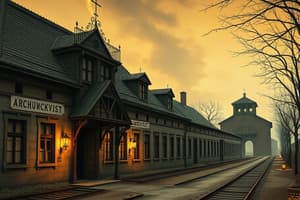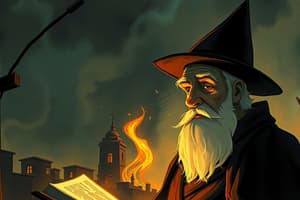Podcast
Questions and Answers
What town did Wiesel grow up in?
What town did Wiesel grow up in?
- Buchenwald
- Sighet (correct)
- Birkenau
- Auschwitz
Moshe the Beadle was believed by the people of Sighet when he returned with tales of horror.
Moshe the Beadle was believed by the people of Sighet when he returned with tales of horror.
False (B)
What horrific sight do Eliezer and his father pass on their way to Auschwitz?
What horrific sight do Eliezer and his father pass on their way to Auschwitz?
- A field of flowers
- Fellow Jews welcoming them
- A group of prisoners escaping
- A pit of burning babies (correct)
What item does Eliezer's father give to him during the selection in Chapter 5?
What item does Eliezer's father give to him during the selection in Chapter 5?
Eliezer assumes that patients in the infirmary will be killed.
Eliezer assumes that patients in the infirmary will be killed.
During what event do prisoners run 42 miles in one night?
During what event do prisoners run 42 miles in one night?
What does an SS guard do in Chapter 8 when Eliezer brings his father soup?
What does an SS guard do in Chapter 8 when Eliezer brings his father soup?
Eliezer is only concerned with ______ during his remaining months at Buchenwald.
Eliezer is only concerned with ______ during his remaining months at Buchenwald.
What happened on April 10 at Buchenwald?
What happened on April 10 at Buchenwald?
Flashcards
Moshe's Warning
Moshe's Warning
Moshe the Beadle, Eliezer's tutor, is expelled from Sighet and returns to warn the townspeople about Nazi atrocities. He describes the horrors he witnessed, including mass shootings and deportations. Despite his vivid account, the townspeople dismiss his warnings as exaggerated and refuse to believe the impending danger. This moment exposes the collective denial and naivety of the community in the face of rising fascism.
Selection at Auschwitz
Selection at Auschwitz
The first selection at Auschwitz, where prisoners are categorized based on their ability to work. Eliezer and his father lie about their ages to appear more fit and avoid immediate death. The scene exposes the dehumanization and arbitrary nature of the Nazi system, where individuals are reduced to mere numbers and their lives are measured by their perceived usefulness.
The Arrival at Auschwitz
The Arrival at Auschwitz
Eliezer encounters the brutal reality of Auschwitz - a stark, cold place where prisoners are stripped of their identities and forced to endure unimaginable hardship. Witnessing the burning pit filled with infants fuels his fear and despair, leaving an indelible mark on his soul. He experiences the crushing weight of loss and the chilling indifference of the Nazi regime.
The Death March
The Death March
Signup and view all the flashcards
The Hanging
The Hanging
Signup and view all the flashcards
Eliezer's Shift in Focus
Eliezer's Shift in Focus
Signup and view all the flashcards
Liberation and Aftermath
Liberation and Aftermath
Signup and view all the flashcards
Loss of Eliezer's Father
Loss of Eliezer's Father
Signup and view all the flashcards
Study Notes
Chapter 1
- Elie Wiesel is raised in Sighet, Transylvania, as a committed Orthodox Jew.
- Experiences with Moshe the Beadle, his tutor who is expelled and returns to warn locals of Nazi atrocities.
- The townspeople reject the warnings as paranoia amidst rising fascism in Hungary.
- Eliezer's family is urged by their gentile servant, Martha, to flee, but they refuse.
Chapter 2
- Eliezer and fellow Jews are transported in cattle cars, suffering extreme conditions.
- Madame Schacter, another prisoner, is tormented for her repeated cries of fire, foreshadowing the horrors ahead.
- Arrival at Birkenau reveals the reality of the situation with visible smoke from crematoria.
Chapter 3
- First selection at Auschwitz; Eliezer and his father lie about their ages to avoid death.
- Witnesses the horrific sight of a burning pit with infants.
- After disinfection and tattooing, they are clothed as prisoners; Eliezer's father is assaulted while seeking relief.
Chapter 4
- Eliezer avoids a dental appointment to keep his gold crown, later learns the dentist was executed.
- He faces brutal beatings from the kapo, Idek, and is warned against revealing Idek’s secret affair.
- A prisoner is shot trying to eat unattended soup during an air raid; three prisoners are hanged, evoking deep sorrow among captives.
Chapter 5
- In late summer 1944, another selection threatens Eliezer’s father, who gives him essentials beforehand.
- Eliezer injures his foot and learns of Russian troops nearing the camp.
- Fearing execution, he exits the infirmary but finds later that patients were liberated.
Chapter 6
- Prisoners endure a 42-mile forced march in a blizzard, facing gunfire for those who lag.
- Eliezer and his father struggle to stay awake to survive the cold.
- Rabbi Eliahu searches for his son, illustrating the bond of survival; Eliezer sees a son abandon his father, haunting him deeply.
Chapter 7
- Survivors are crammed into cattle cars bound for Germany, witnessing frequent removal of corpses.
- German workers throw bread into the cars to incite violence among starving prisoners; Eliezer narrowly escapes death.
Chapter 8
- Upon reaching Buchenwald, Eliezer’s father is incapacitated; Eliezer prioritizes sharing food even when advised against it.
- His father begs for water but is brutally treated by an SS guard; Eliezer finds his father missing the following morning, feeling a complex sense of relief.
Chapter 9
- Eliezer’s focus solely on food grows amidst the worsening camp conditions.
- Evacuations begin; mass murders occur daily within Buchenwald.
- Camp liberation arrives, but Eliezer suffers food poisoning; he is shocked by his appearance in a mirror post-recovery.
Studying That Suits You
Use AI to generate personalized quizzes and flashcards to suit your learning preferences.




